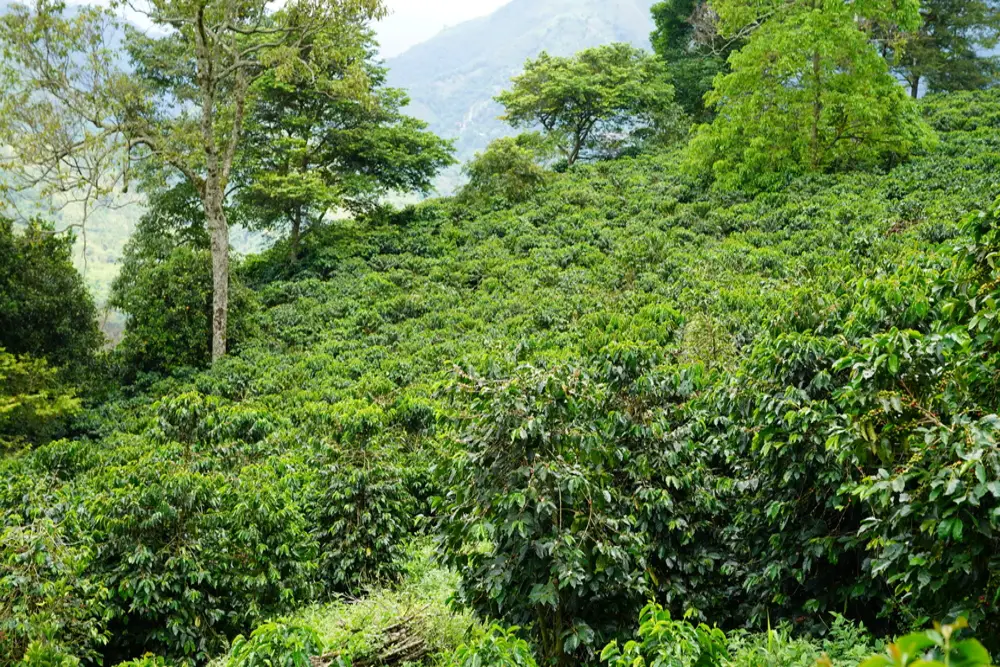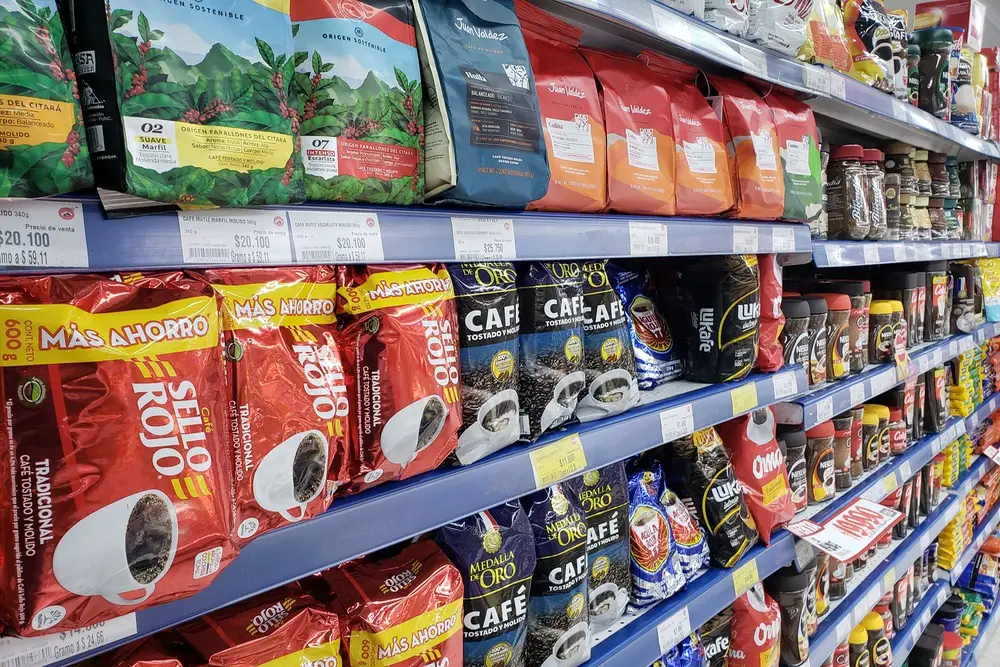Organic is the latest buzzword and the food and beverage industry is at the forefront of organic sales growth. For example, an organic variety that is grown without pesticides and inorganic fertilizers has established itself on the coffee market.
In fact, organic coffee accounts for about a third of all organic beverages sold worldwide.
In addition, people today make their purchasing decisions more and more consciously and ask themselves where, how, when and by whom the products were manufactured.
Table of Contents
What is organic farming?
Organic farming is a method in which the crops are grown and cared for using organic materials, without the use of synthetic fertilizers and pesticides. In addition, the use of genetically modified organisms is not permitted.
Organic farming systems have great potential to provide the world with healthy and quality food. Organic farming has several environmental benefits such as improving soil fertility, combating soil erosion and reducing greenhouse gas emissions compared to other forms of farming.
Organic food helps reduce the risks from pesticides to human health compared to conventional food. Food from organic farming is rich in nutrients such as vitamins, enzymes, minerals and other micronutrients compared to food from conventional farming.
This type of food attempts to maximize health benefits by minimizing harmful man-made chemicals such as pesticides and fertilizers.
Consuming organic products means enjoying foods and beverages free from additives, preservatives, fillers and chemical sugars.
Organic coffee market
Organic coffee is not only used in the food and beverage industry, but also in the cosmetic, pharmaceutical and personal care industries. However, the food and beverage sector is at the forefront of demand. The different types of organic coffee that are available in the market are espresso coffee, fair trade coffee, coffee capsules and gourmet coffee.
Chlorogenic acid, fatty acids, flavanols, and catechins are some of the many antioxidants found in coffee.
Geographically, North America is a key market for organic coffee as it is an already established organic food market. Europe and Latin America are also expected to become significant markets due to massive coffee consumption in both regions. The Asia-Pacific market is also expected to gain importance due to rapid urbanization and the permeation of the coffee shop concept in Western culture.
The organic coffee market is estimated to reach US$13.4 billion by 2027 and will grow at a CAGR of 8.3% during the forecast period 2022-2027.
Organic coffee has grown in popularity in recent years as consumer preferences have shifted towards natural foods and a sustainable lifestyle. One of the main reasons behind the market expansion is the growing global awareness of the benefits of organic food and beverages.
Organic Coffee Market by Application
The organic coffee market can be segmented by application into Food & Beverage, Pharmaceutical, Cosmetic & Personal Care, and Other.
The food and beverage segment held the largest market share in 2021. This growth is due to the widespread adoption of organic coffee, which includes antioxidants in confectionery and baked goods, direct ingestion, dairy, smoothies and shakes.
In addition, it is estimated that the Cosmetics & Personal Care segment will grow in the future as the development of cosmetic products containing organic coffee with antioxidants increases and awareness of the benefits of topical (external/local) application of coffee increases, e.g. how it can contribute to the revitalization, cleansing and soothing of the skin.
Organic Coffee market by distribution channel
By distribution channel, the organic coffee market can be segmented into hypermarket/supermarket, department and convenience stores, specialty stores, online distribution channels, and others.
The hypermarkets/supermarkets segment held the largest market share in 2021. This growth is due to the fact that supermarkets and hypermarkets are large retail outlets, typically offering an assortment of retail categories under one roof.
Walmart, Tesco, Aldi, Kroger, Carrefour, Whole Foods Market, and other major retailers have a strong presence in organic coffee distribution.
Organic coffee market by origin
The organic coffee market can be classified by origin in Coffea Arabica and coffee Subdivide Canephora. coffee Arabica is the most consumed in the organic coffee market. coffee Canephora is a less common variety.
Market for organic coffee according to Art
The organic coffee market can be segmented by type, be it fair trade coffee, gourmet coffee, espresso coffee or coffee capsules.
Organic Coffee Market Drivers
The main driver of the organic coffee market is its ethical nature. Most organic coffee producers use the fair-trade method to pay growers correctly, which will attract a large number of ethical consumers worldwide. The advantages of organic coffee over conventional coffee and the higher prices are also likely to further boost the global organic coffee market.
Challenges of the organic coffee market
Low market penetration and high prices can limit the organic coffee market. Manufacturers in the organic coffee market need to focus on their marketing strategy to successfully conquer the untapped market.
Organic coffee is typically 20% more expensive than regular coffee. Organic coffee is grown using natural fertilizers and pesticides, which drives up overall production costs. In addition, the process of obtaining organic certification and control is expensive, resulting in an additional cost of around 10-15% compared to traditional coffee.
Certification and control costs are difficult to calculate as they depend on the type and intensity of conventional farming practices prior to conversion to organic farming. The high manufacturing and certification costs consequently increase the cost of organic coffee. These issues are hampering the growth of the organic coffee market.
Coffee cultivation consists of various processes which, although only the end product produced is visible, generally represent an iceberg. This hides a series of ecological problems, the resistance of the farmers, the fight to preserve biodiversity and the constant search for more efficient coffee farmers.
In addition, there is evidence that rural areas in Latin America are characterized by deep-seated poverty and environmental degradation driven by some of the economic policies implemented in the region, coupled with ongoing government efforts to address these challenges.
Human health benefits
Due to the multitude of additives such as sugar, preservatives, and artificial flavors, non-organic beverages offer great taste but no health benefits. In contrast, organic drinks offer consumers great taste thanks to original but fresh flavors.
Organic drinks contain a rich supply of beverage enzymes, vitamins and minerals. This allows the body to eliminate toxins better, increase the supply of oxygen, strengthen the immune system and enable the regeneration of healthy cells.
Problems with organic products
As described, the theory looks reasonable. The practice, however, looks different. We do not live in a perfect world and where there is money to be made, there is cheating. As an example, remember the large multinational corporations, which always pretend to be innocent through public relations and clever advertising, but, for example, offer products made from child labor or pump out the groundwater from the local population.
Also organic is not always the last word. If, like in Spain, you build up entire landscapes with greenhouses and destroy forests and natural landscapes and animal habitats, you can certainly not speak of sustainability.
There is also a myriad of certifications, no normal consumer can keep track of them. And as a consumer I should ask myself, do I really want to buy an organic product from China in the supermarket? Is this really organic and is it really sustainable?
Conclusion
The basic idea behind organic was certainly created with good intentions. However, they also say that the road to hell is paved with good intentions.
Organic certainly has a right to exist and an additional price can be justified. However, as a consumer, one should always maintain a healthy level of skepticism and not believe everything that is told in glossy brochures.



